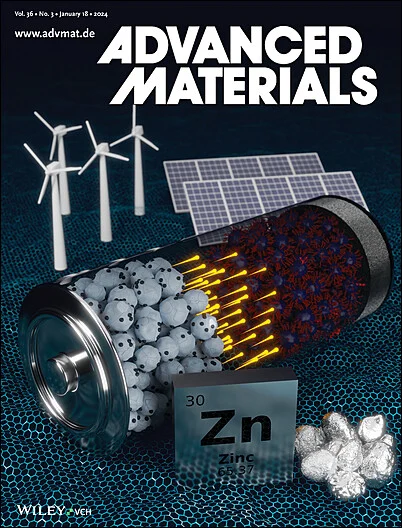LiC6@Li as a Promising Substitution of Li Metal Counter Electrode for Low-Temperature Battery Evaluation
IF 27.4
1区 材料科学
Q1 CHEMISTRY, MULTIDISCIPLINARY
引用次数: 0
Abstract
Li metal, as a counter electrode, is widely used for electrode materials evaluation in coin type half-cells. However, whether this configuration is suitable for different working conditions has often been neglected. Herein, the large resistance and high cathodic/anodic over-potential of Li metal at low temperature are highlighted, revealing its incompetence as counter electrode on cryogenic condition. In view of this, a novel LiC6@Li composite electrode is developed as a promising substitution for electrode materials evaluation. In the LiC6@Li electrode, Li+ de-intercalated from LiC6 preferentially due to the low interface resistance of LiC6, presenting a cathodic/anodic over-potential of 0.05 V (67 µA cm−2) at −20 °C, which is ten times lower than that of Li metal. Moreover, the rapid lithium replenishment into LiC6 from Li metal enables a stable potential of LiC6@Li. Consequently, the LiC6@Li-based half-cells enabled more precise evaluation of the Li+ storage potential and specific capacities of a series of electrode materials at low temperature. As an extension, KC8@K is also successfully prepared as a superior counter electrode to K metal. This work proposes a suitable counter electrode for more accurately evaluating electrode materials at subfreezing scenarios, demonstrating the necessity of specialized electrode evaluation systems for particular operating conditions.

求助全文
约1分钟内获得全文
求助全文
来源期刊

Advanced Materials
工程技术-材料科学:综合
CiteScore
43.00
自引率
4.10%
发文量
2182
审稿时长
2 months
期刊介绍:
Advanced Materials, one of the world's most prestigious journals and the foundation of the Advanced portfolio, is the home of choice for best-in-class materials science for more than 30 years. Following this fast-growing and interdisciplinary field, we are considering and publishing the most important discoveries on any and all materials from materials scientists, chemists, physicists, engineers as well as health and life scientists and bringing you the latest results and trends in modern materials-related research every week.
 求助内容:
求助内容: 应助结果提醒方式:
应助结果提醒方式:


